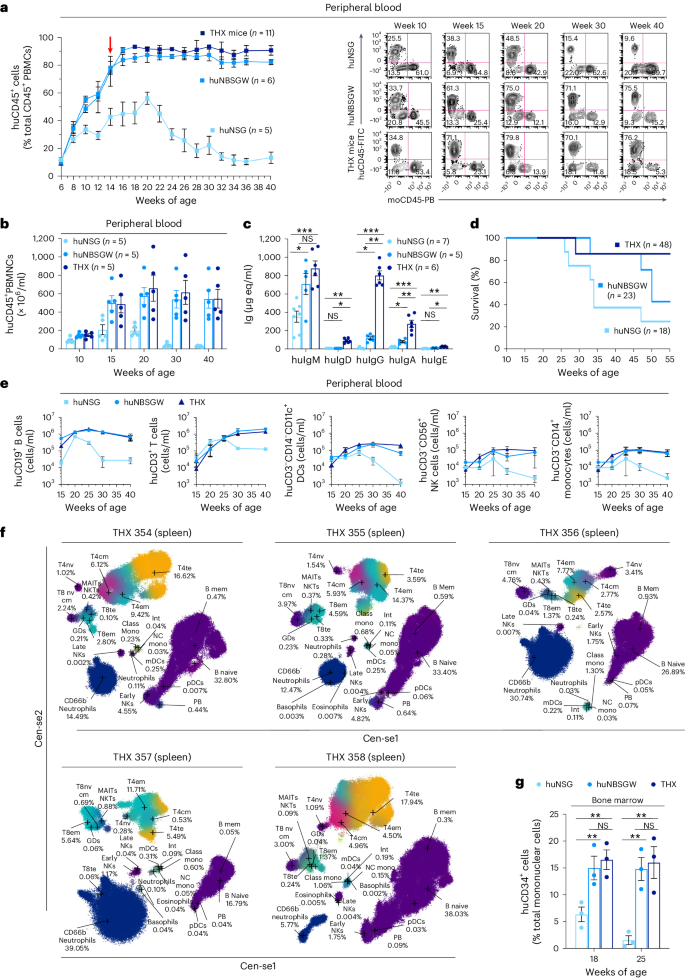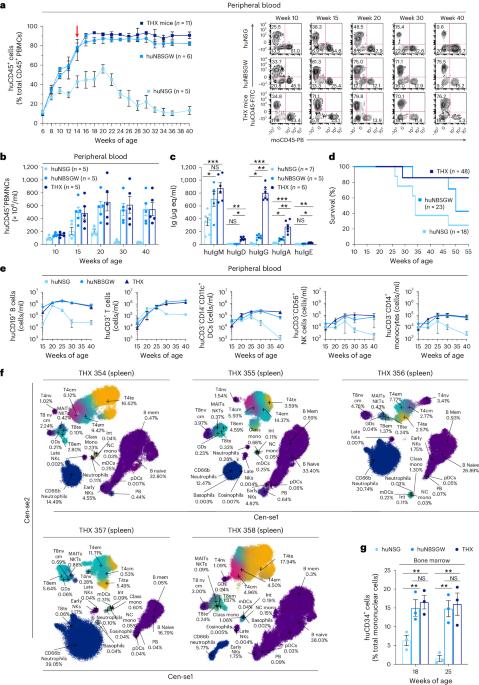一种能产生成熟的类别转换、高突变和中和抗体反应的人源化小鼠
IF 27.7
1区 医学
Q1 IMMUNOLOGY
引用次数: 0
摘要
人源化小鼠在模拟人类免疫方面存在局限性,尤其是在抗体反应方面。在这里,我们用人类脐带血 CD34+ 细胞嫁接非γ-辐照、基因缺损的 KitW-41J 突变免疫缺陷幼鼠,然后用 17β-estradiol 调节促进免疫细胞分化,从而构建了人源化(THX)小鼠。THX 小鼠重建了人类淋巴和骨髓免疫系统,包括边缘区 B 细胞、生殖中心 B 细胞、滤泡辅助性 T 细胞和中性粒细胞,并发育出成形的淋巴结和肠道淋巴组织,包括佩耶氏斑块和人类胸腺上皮细胞。这些小鼠具有多样化的人类 B 细胞和 T 细胞抗原受体谱系,能产生成熟的依赖 T 细胞和不依赖 T 细胞的抗体反应,包括体细胞超突变、类开关重组、浆细胞和记忆 B 细胞分化。接种鞭毛蛋白或辉瑞冠状病毒病 2019 mRNA 疫苗后,THX 小鼠会对沙门氏菌或严重急性呼吸道综合征冠状病毒 2 Spike S1 受体结合域产生中和抗体反应,血液中的人类细胞因子(包括 APRIL、BAFF、TGF-β、IL-4 和 IFN-γ)会增加,所有这些细胞因子都处于生理水平。注射普利司坦后,这些小鼠也会出现狼疮自身免疫。通过利用雌激素活性支持人类免疫细胞分化和抗体反应成熟,THX 小鼠为研究人类免疫系统以及开发人类疫苗和疗法提供了一个平台。本文章由计算机程序翻译,如有差异,请以英文原文为准。


A humanized mouse that mounts mature class-switched, hypermutated and neutralizing antibody responses
Humanized mice are limited in terms of modeling human immunity, particularly with regards to antibody responses. Here we constructed a humanized (THX) mouse by grafting non-γ-irradiated, genetically myeloablated KitW-41J mutant immunodeficient pups with human cord blood CD34+ cells, followed by 17β-estradiol conditioning to promote immune cell differentiation. THX mice reconstitute a human lymphoid and myeloid immune system, including marginal zone B cells, germinal center B cells, follicular helper T cells and neutrophils, and develop well-formed lymph nodes and intestinal lymphoid tissue, including Peyer’s patches, and human thymic epithelial cells. These mice have diverse human B cell and T cell antigen receptor repertoires and can mount mature T cell-dependent and T cell-independent antibody responses, entailing somatic hypermutation, class-switch recombination, and plasma cell and memory B cell differentiation. Upon flagellin or a Pfizer-BioNTech coronavirus disease 2019 (COVID-19) mRNA vaccination, THX mice mount neutralizing antibody responses to Salmonella or severe acute respiratory syndrome coronavirus 2 Spike S1 receptor-binding domain, with blood incretion of human cytokines, including APRIL, BAFF, TGF-β, IL-4 and IFN-γ, all at physiological levels. These mice can also develop lupus autoimmunity after pristane injection. By leveraging estrogen activity to support human immune cell differentiation and maturation of antibody responses, THX mice provide a platform to study the human immune system and to develop human vaccines and therapeutics. Humanized mice have been a valuable tool for modeling human immunology but are limited in their ability to model human antibody responses. Here the authors present their THX humanized mouse that does model human antibody responses and test its suitability for vaccination and autoimmunity studies.
求助全文
通过发布文献求助,成功后即可免费获取论文全文。
去求助
来源期刊

Nature Immunology
医学-免疫学
CiteScore
40.00
自引率
2.30%
发文量
248
审稿时长
4-8 weeks
期刊介绍:
Nature Immunology is a monthly journal that publishes the highest quality research in all areas of immunology. The editorial decisions are made by a team of full-time professional editors. The journal prioritizes work that provides translational and/or fundamental insight into the workings of the immune system. It covers a wide range of topics including innate immunity and inflammation, development, immune receptors, signaling and apoptosis, antigen presentation, gene regulation and recombination, cellular and systemic immunity, vaccines, immune tolerance, autoimmunity, tumor immunology, and microbial immunopathology. In addition to publishing significant original research, Nature Immunology also includes comments, News and Views, research highlights, matters arising from readers, and reviews of the literature. The journal serves as a major conduit of top-quality information for the immunology community.
 求助内容:
求助内容: 应助结果提醒方式:
应助结果提醒方式:


